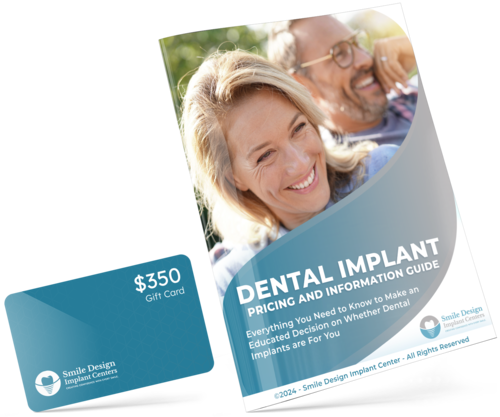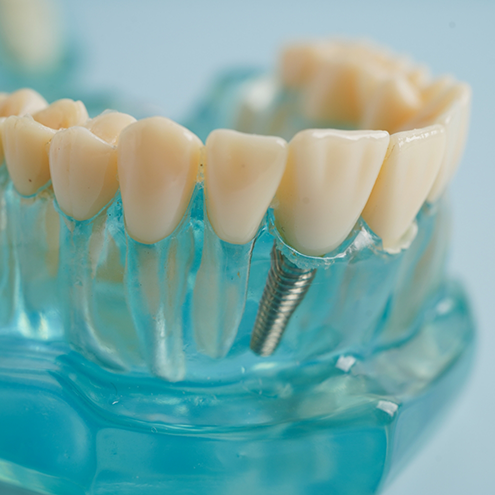Dental implants are an incredible solution for replacing missing teeth because they can do things that other restorations can’t; for instance, they replace the root structure of missing teeth, whereas traditional dentures do not. But the advantages don’t stop there; dental implants offer all sorts of other impressive, life-changing benefits! To learn more about dental implants in Reno and how our team can use them to restore your smile and boost your quality of life, contact our office today.
Why Choose Smile Design Implant Centers for Dental Implants?
- Entire Implant Process Completed In-House
- Flexible Financing Options Available
- Skilled Dental Team with Years of Experience

The Guide Will Show You
- Dental Implant Options
- Average Pricing
- Factors that Affect Eligibillity
- And More!
What Are Dental Implants?
Dental implants are small posts made from titanium that are surgically placed directly into a patient’s jawbone. Since they’re made from titanium, which is biocompatible with bone tissue, they can fuse with a patient’s jaw and act as replacement tooth roots for a corresponding dental restoration. They also offer incredible, unmatched oral functionality and effectively prevent future bone resorption. Better yet, under ideal circumstances, dental implants have the potential to last for decades or even a lifetime!
The 4-Step Dental Implant Process
- Initial Dental Implant Consultation – During this appointment, we’ll be able to evaluate your tooth loss and oral health to determine if dental implants are a viable option. Patients with insufficient jawbone density or compromised gum health might need to undergo preliminary procedures before receiving dental implants.
- Dental Implant Surgery – We can complete the entire dental implant process here in our Reno dental office, which ultimately saves your time and energy, and also makes coordinating things much easier. The procedure itself is very straightforward; the implants are placed where they’re needed directly into the jawbone via a minor surgical procedure.
- Dental Implant Osseointegration/Abutment – After the implants have been placed, osseointegration can begin, which is the process in which the biocompatible posts fuse with the bone tissue. This ensures future stability for your custom restoration. Abutment pieces are attached to these posts once they’ve fused with the jaw.
- Delivery of Dental Implant Restoration(s) – Once everything has healed, we’ll call you back in to deliver your custom-made dental restoration, which is attached to your abutments. After making sure that everything looks and functions correctly, you’ll be free to enjoy your brand-new smile!
Who Dental Implants Can Help
If you’re interested in addressing tooth loss head-on with dental implants, we have good news for you: they are quite versatile! If you want to find out if you’re a candidate, then schedule a consultation with our Reno dental team so we can learn about both your dental needs and smile goals. If you want to learn more before booking an appointment, then read on.

Who Is a Good Candidate for Dental Implants?
Simply put, there are a variety of factors that go into whether or not a patient is a good candidate for dental implants. A few examples include if you stay on top of your at-home and professional dental hygiene regimen, if you are willing to break bad habits, like smoking, and if your gums are healthy. Of course, dental implants require healthy bone structure to be successful, so patients should have enough natural bone to hold an implant as well. If your jawbone has receded over time, a bone graft may be required to correct this issue and allow you to receive dental implants.

Missing One Tooth
Whether there is a noticeable gap when you smile or you’re missing one of your back molars, don’t worry – dental implants may be an option! If that’s the case, we will insert the implant into your jawbone, wait for it to fuse properly, and then attach a custom dental crown on top. Not only will your replacement tooth look like the real thing, but it will feel equally as natural. So, you don’t have to worry about unwanted attention being drawn to your smile; the final result will be seamless.

Missing Multiple Teeth
Previously, dental bridges or partial dentures were required to replace several missing teeth. Although these are still great options, dental implants are considerably more popular because they are the only tooth-replacement solution that stimulates your jawbone (which helps prevent bone loss). Plus, your healthy enamel doesn’t need to be altered in the process of filling the gaps in your smile. So, if you are missing several teeth in a row or multiple teeth throughout your mouth, consider dental implants!

Missing All Teeth
If you are missing all of your teeth, then you know first-hand how difficult it can be to smile confidently, eat a well-balanced diet, and communicate clearly. Fortunately, a denture can be attached to 4-8 strategically placed dental implants, giving you a healthy, complete, and beautiful smile again. If this sounds like the solution you’ve been looking for, then don’t hesitate to schedule a consultation at our Reno dental office so we can determine if this is the best tooth-replacement option for you. There’s a good chance the answer is “yes!”
Benefits of Dental Implants
Dental implants are the closest restoration option to your natural teeth. They can replace a single missing tooth, a row of teeth, or even all of your teeth. Your implant dentist will design your restoration to look natural and blend in with your smile, so no one will be able to tell that you have a dental prosthetic.
When you lose a tooth, your jawbone will begin to recede from lack of stimulation. This can cause your cheeks to look sunken, give you wrinkles, and make you look older than you are. Dental implants are the only restorative dentistry treatment that can stop jawbone resorption.
Dental implants will also restore your chewing function and prevent jawbone degeneration. Because you can eat whatever you want with implants and don't have to worry about damaging your restoration, your lifestyle will likely improve dramatically.
Maintaining & Caring for Your Dental Implants
Can you imagine investing your valuable time and money in the dental implant process, only for yours to fail within a matter of months or years? Fortunately, there are several steps you can take to prevent that from happening (as well as a few habits you should avoid). To learn what they are, read on!

Make Oral Hygiene a Priority
Although your dental implants are artificial and, therefore, cannot decay, your natural teeth still can, and your gums can develop an infection if you neglect them. So, make sure that you focus on being consistent with brushing, flossing, and rinsing with mouthwash. It’s also important to replace your toothbrush every quarter, clean your toothbrush holder, and throw out any expired products.

Eat a Healthy Diet
While some foods benefit your oral health, others have the opposite effect. That’s why it’s so important to stick to a healthy, well-balanced diet that’s filled with lots of smile-friendly foods, like fresh fruits and lean proteins. It’s equally as important to steer clear of hard pretzels, candy canes, taffy, peanut brittle, and other foods that can tug on your restoration or break it.

Break Bad Habits
Some habits are known for being dangerous, like smoking. Others seem harmless, like biting your nails or chewing on ice cubes. The reality is that even these increase your risk of dental implant failure. So, if you haven’t already, now is the time to commit to quitting. If you need some help, don’t hesitate to ask us about what has worked for other patients!
Important note: Do NOT use your teeth as tools! Always use scissors to remove plastic wrapping or a bottle cap opener to remove a bottle cap. It’s a small step that will make a dramatic difference when it comes to the lifespan of your dental implants.

Protect Your Dental Implants
Implementing a solid oral hygiene regimen at home and breaking bad habits will protect your dental implants, but there’s another important step you need to take: wearing a mouthguard when you’re active. Similarly, you should wear a nightguard if you grind or clench your teeth at night. That way, your restoration doesn’t chip or crack under the pressure.

Schedule Regular Dental Checkups
As we mentioned above, dental implants cannot decay. It is possible for them to become loose, however. With routine checkups, we can monitor their condition while also screening for oral cancer, tooth decay, gum disease, and other serious problems. Plus, the cleanings ensure plaque and tartar are removed before they wreak havoc on your oral health.
Dental Implant FAQs
If properly cared for, your dental implants can last a lifetime. The implant itself is permanently secured to your jawbone, however its lifespan greatly depends on how well you take care of your oral health.
To ensure that they last as long as possible, it is important that you brush and floss them just as you would your natural teeth and attend dental checkups regularly. Furthermore, do not use them for anything other than chewing food, and try to avoid anything that is too hard or sticky.
Finally, if you are a smoker, it is important to quit, as in addition to causing myriad health problems, smoking can also increase your odds of implant failure.
No, you cannot take your dental implants out because they are permanently fixed to the bone. If they need to be removed, your dentist must perform the procedure. The crown and abutment portion of your implants can be removed and replaced as needed.
There are also some types of implant dentures that can be removed for cleaning. Your dentist can explain your options for what type of implant is best for your mouth at your consultation appointment.
Your mouth will be numbed with local anesthesia prior to the start of your dental implant procedure, so you should not feel any pain. You may also be sedated during this time, which will lower your body’s ability to register pain.
Though your jawbone does not have very many nerve endings, you may still experience a little soreness for a few days after the procedure. This can be alleviated with the help of over the counter or prescription pain medications as directed. You can also apply cold compresses for 20 minutes at a time.
Should your discomfort worsen instead of improving after two or three days, contact your dentist as soon as possible.
Because your dental implants are not biological teeth, they cannot decay or get cavities, however any of your remaining natural teeth still can. Your gums can also still become infected, causing a condition known as peri-implantitis. This is one of the main causes of dental implant failure. Thus, maintaining proper oral hygiene is still extremely important after dental implant surgery, even if you’ve replaced all of your teeth.
Dental Implant Post-Op Instructions
Once you receive your new dental implants, there are a few steps you’ll need to take to ensure a swift and successful recovery. The dental implant post-op instructions in Reno that you’ll receive will help you avoid complications and instead encourage proper healing as you move one step closer to enjoying life with a new, permanent smile.

What to Do Directly After Dental Implant Surgery
When your dental implant surgery is complete, you’ll need to make sure that you have someone who can take you home to start the recovery process. The anesthesia administered at the start of your procedure will need time to wear off, so you will be unable to drive.
Once you are home, make sure to have an over-the-counter pain reliever readily accessible so that you can take it once you notice the anesthesia wearing off. This will reduce the amount of discomfort you experience, which is normal.
If you smoke, do not attempt to pick up your habit right away. Instead, wait at least 24 hours. Nicotine will only prolong the healing process – a factor that causes many dentists to strongly urge patients to quit before receiving dental implants.

Common Side Effects
Do not be alarmed if you notice some slight bleeding and swelling after your procedure. This is normal. It will take time for your gums and bone to heal, so feel free to use a cold compress to reduce inflammation and discomfort. If you do notice that these post-operative side effects do not decrease but instead increase, call our office right away.

Diet
The first several days after your procedure, you’ll want to stick to a liquid diet to allow your mouth more time to heal. After that, you are free to incorporate soft foods such as pudding, yogurt, mashed potatoes, etc. This will allow you to receive more nutrients but avoid pressure placed on your gums and bone.
Once your mouth begins to feel “normal,” you can introduce solid foods into your diet.

Health & Oral Hygiene
The day you return home from your procedure, you’ll need to leave your mouth untouched; however, after a full 24 hours, you can resume your normal oral hygiene routine. Brushing and flossing are essential to ensure bad bacteria do not infect the surgical sites, but you will need to be careful not to aggravate your dental implants in Reno.
Instead of using mouthwash to rinse your mouth, gargle with warm salt water, as this will help to alleviate discomfort and encourage healing. Just be careful not to spit.

What to Do After Your New Teeth Are Attached
Once your custom restoration is secured in place by your implant dentist in Reno, you can begin to enjoy life with your new dental implants. It’s not uncommon to experience some slight sensitivity; however, this will dissipate within a few days. Also, you may need time to adjust to your new teeth, especially a denture, if you’ve been without teeth for some time.






